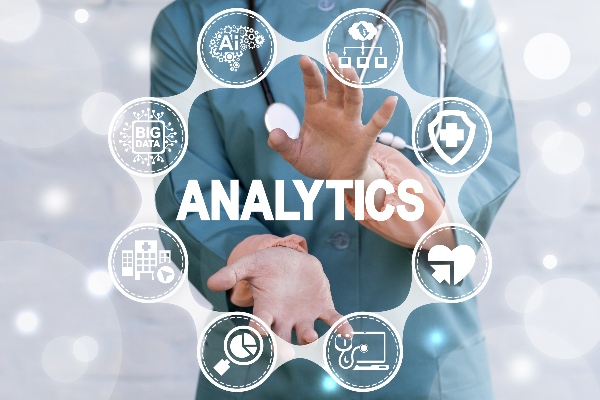
As technology evolves, so does the ability to collect and interpret massive volumes of healthcare data analytics. Hospitals, clinics, and research institutions now generate more medical data than ever—from electronic health records (EHRs) and medical histories to real-time inputs from wearable devices and diagnostic tools. This growing ecosystem of patient information has created both an opportunity and a challenge: how to turn raw health data into actionable insight.
Hospital analytics helps bridge that gap. By applying data science techniques to medical records, patient data, and operational systems, healthcare organizations can make smarter decisions, reduce waste, and improve patient outcomes.
In the sections below, we'll explore how analytics is transforming the healthcare industry, enabling healthcare professionals, and ultimately enhancing patient care across the board.
What are Hospital Analytics?
Hospital analytics refer to the use of advanced data analytics tools within the healthcare environment to transform large volumes of patient data, clinical information, and operational metrics into actionable insights. It is a specialized segment of healthcare data analytics that supports better decision-making across hospital systems, administrative teams, and clinical staff.
Key data sources used in hospital analytics include:
- Cost & Claims Data: Financial trends, billing patterns, and reimbursement models
- Clinical Data: Diagnostic information, treatment plans, and real-time patient monitoring
- Pharmaceutical & Research Data: Trial outcomes, drug performance, and R&D efforts
- Patient Behavior & Sentiment Data: Survey responses, appointment trends, and satisfaction levels
- Electronic Health Records (EHRs): Longitudinal patient histories, lab results, and care timelines
Analyzing this data allows healthcare organizations to identify trends, eliminate inefficiencies, and make informed decisions in real time. Hospital analytics supports smarter resource allocation, reduces delays in treatment, and strengthens the delivery of healthcare services.
It also helps uncover gaps in care, track departmental performance, and guide targeted interventions that improve patient outcomes across the entire healthcare system.
1. Reduce Administrative Overhead
Administrative costs are among the most difficult expenses to control within a hospital system. With so many departments, vendors, and service lines operating simultaneously, waste can occur in areas that are easy to overlook, such as laundry, food service, or pharmacy restocking. Hospital analytics makes it possible to track spending patterns across departments in real time and compare them against performance benchmarks.
By analyzing this data, leadership can identify where operations drift away from budgeted expectations or where duplicate processes and inefficiencies drive up costs. This enables hospitals to make informed financial decisions without compromising health care services or patient safety.
Over time, these adjustments can free up budget for technology upgrades, staffing, and direct care investments, helping the hospital operate more efficiently while continuing to meet clinical demands.
2. Detect & Prevent Fraud
Financial fraud in the healthcare industry can take many forms, including false claims, duplicate billing, and unauthorized vendor payments. Without a data-driven system in place, it's difficult to catch these issues before they result in significant financial damage. Hospital analytics allows organizations to monitor billing activity, track reimbursement timelines, and flag inconsistencies that could signal fraudulent behavior.
By comparing medical data against submitted claims, hospitals can verify that services were rendered appropriately and identify suspicious trends. This proactive approach strengthens internal controls and ensures that resources are being used to support legitimate care efforts.
Reducing fraud also protects long-term funding, improves compliance, and most importantly, protects patients by ensuring their care is not affected by misallocated funds or administrative error.
3. Strengthen Care Coordination
A major challenge in large hospital systems is maintaining seamless communication between clinical teams, administrative staff, and support departments. Disconnected data systems can slow down procedures, delay diagnoses, or lead to incomplete information during treatment. Hospital analytics helps bridge these gaps by integrating electronic health records (EHRs), scheduling data, and departmental workflows into a unified platform.
When care teams have quick access to updated patient data, they can work together more efficiently, reducing handoff errors and ensuring that each patient's care plan stays on track. This coordination is especially critical for patients with chronic conditions, surgical follow-ups, or complex medication needs.
By improving internal communication, hospitals can lower the risk of missed steps, speed up response times, and improve the quality of service delivery across the board.
4. Personalize Care & Improve Patient Outcomes
Generic treatment plans often fail to consider the full picture of a patient's medical history, lifestyle, or genetic risk factors. With hospital analytics, providers can analyze a wide range of healthcare data—including lab results, previous diagnoses, and biometric readings—to tailor treatment strategies to each individual. This approach improves the accuracy of diagnoses and the effectiveness of interventions, helping reduce complications and avoid unnecessary treatments.
Personalized care also supports better recovery timelines and increases patient satisfaction. When treatment plans align with both clinical data and patient context, outcomes improve across metrics like readmission rates, medication adherence, and long-term prognosis.
At a broader level, these improvements contribute to better public health outcomes by reducing the overall burden on emergency rooms and critical care units.
5. Protect Patients & Support Compliance
Data integrity is critical to both patient safety and regulatory compliance. Hospitals are responsible for securing patient information, monitoring who accesses it, and ensuring that records are accurate and complete. A robust analytics platform can track data activity in real time, flag unauthorized access attempts, and support consistent documentation across systems.
Beyond privacy, hospital analytics also enhances response capabilities. When medical records are current and well-organized, providers can act faster during emergencies, recall alerts, or clinical escalations. Hospitals can also use analytics to audit clinical practices, verify medication accuracy, and identify unusual patterns in health data that may signal broader risks.
In doing so, the system not only improves operational efficiency but also strengthens its ability to protect patients at every level of care.
Partner with Data Experts to Get the Most Beneficial Hospital Analytics

